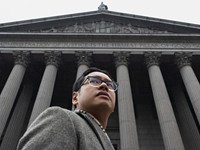[
{
"name": "500x250 Ad",
"insertPoint": "5",
"component": "15667920",
"parentWrapperClass": "",
"requiredCountToDisplay": "1"
}
]
Invasion of privacy has become rampant. Surveillance cameras are inching us closer to a Big Brother society that we once rigorously opposed.
Some states have discussed having license plates identify drivers who have DUI histories. The insurance industry wants "black boxes" in cars to record drivers' weight and personal conversations leading up to a crash.
Creationism is taught in some public schools. Taxpayers fund faith-based private schools and charities. And Florida Governor Jeb Bush wants his state to fund pre-school programs that teach religion.
That's what's going on in the United States today.
And all of that, says Barbara Williams de Leeuw, makes the American Civil Liberties Union more relevant than ever, especially in the wake of 9/11 and the Patriot Act.
De Leeuw is executive director of the New York Civil Liberties Union's Rochester and Genesee Valley chapter, which last week celebrated its 40th anniversary. Nationally, the ACLU has about 400,000 members; about 2500 people are members of the Genesee Valley chapter, which extends from Rochester south to the Pennsylvania border.
A former school teacher, de Leeuw says patriotism has fueled her new career. And she insists that Americans must do their homework; an informed citizen, she says, is the best defense against those who want to erode the Bill of Rights.
In a recent interview, de Leeuw discussed current challenges to civil liberties and the work of the ACLU --- which, she says, is not the "liberal" organization its critics say it is. Following is an edited transcript of that conversation.
What have you been working on lately?
One of the issues germane to us locally has been military recruitment. The No Child Left Behind Act requires every school system in the state to give student information to the government for the purposes of military recruitment. The NYCLU has filed a suit in the Manhattan federal court to say that people ought to be able to "opt in" rather than "opt out": If parents want to share personal data with the military recruiters, they have to write and say yes. Otherwise, it is assumed that the recruiters will not be given the information.
But that is a clear violation of the way the law has been written.
We are concerned with the City School District in particular, because they are dealing with more students from poor backgrounds, compared to schools in the suburbs, where parents are more informed and have greater options for students.
We just finished depositions on a case involving MCC. This is a case of a lesbian couple. One of them is non-teaching faculty. She has a contract, but the contract does not give spousal benefits. However, MCC has chosen to give health benefits to married couples. This person was married in Vermont and in Canada, and is asking for equal rights here. The college has denied that request. [New York Attorney General] Spitzer recognizes these marriages performed in other states. MCC does not.
Locally, the ACLU seems to have been fairly quiet.
I absolutely disagree with you. We've been discussing several issues: the GPS system for tracking violent sex offenders, the DUI identification on license plates, and the police use of tasers. We have spoken out on the radio-frequency-technology system in cars, which has tremendous advantages for knowing how fast your car is going in the event of accident. However, if you don't know it is there, it presents tremendous privacy issues.
There was even some proposed legislation where the insurance industry not only wanted to know the physics of the accident --- which we have no problem with --- but also wanted to know the weight of the driver, personal conversations leading up to the accident. That is clearly an invasion of privacy.
How do we protect our freedom if we are becoming more tolerant of news with a political bias, revisionism, and infotainment news?
I think the general public has been snowed by it. I think they are just beginning to understand the significance. I spoke to a woman who was saying our privacy issues are secondary: "The government needs this information" --- you know, the whole argument about protecting ourselves against terrorists.
But what about profiling someone you think is a terrorist, but they're not? People need to remember that we are a free and wonderful country because we are based on the principles of law. I told the woman: Read your Bill of Rights.
But people are beginning to wake up and see what all of this means. Conservatives, progressives, Republicans, Libertarians --- it doesn't matter. It is the father from Greece who calls me and says his 17-year-old son was arrested and spent the night in jail because he leaned against the fence at the Port Authority by the new fast ferry. He didn't realize that it is an international border.
They weren't drinking, drugging, or having sex or causing any kind of problem. They were just hanging out like teenagers do. In the old days, the Rochester police would pull up and say, It's getting late, time to move along. The Border Patrol had him arrested. The father was a conservative, and he was a Bush supporter, and he was mad as hell. And I said: "Welcome to the Patriot Act. Your son gets to spend the night in jail. You get to pick up a lot of legal fees. Read the Patriot Act."
The ACLU has the reputation of being strictly a liberal organization.
The ACLU sees itself as a traditional and conservative organization. In fact, we are one of the most conservative. If we are supporting the constitution and the Bill of Rights, how much more conservative can you be?
We are in the courtrooms, we are in the media, and we are lobbying. We are here to provide you with information that may be you can't get easily from other sources.
Do you think the public is listening?
I think they are beginning to listen. We have been asleep. People are saying, "No, no, no; that law wasn't supposed to apply to a father and son in Greece. That law was supposed to apply to those people. You're not supposed to be going into my public records. You're supposed to be going into their records."
When you support the principle of law, it is equally applied. It is applied to "those people," and it is applied to you, too.
Are you worried about the separation of church and state?
I think there are some very strong pulls toward theocracy, which is kind of amazing when you consider that we have some issues with this in other societies. But very consciously the First Amendment includes the separation of church and state. The founding fathers were not anti-Christian or anti-religion. They realized how very powerful this mixture can be for people, and I would argue that because it is the first Amendment, they saw it as the highest priority.
Government and religion should be separated. You have the right to practice your religion, whatever it is --- or not. Decisions at the governmental level should not be influenced by any religious beliefs. And I frankly think our current administration doesn't read very well.
Putting aside the ACLU for a moment, what concerns Barbara Williams de Leeuw?
I think the issues of privacy and technology are going to be the hot buttons of the near future. Our whole society's skill level with technology continues to move forward, and our dependency on information continues to increase. It's not that we shouldn't embrace technology. But we need to be aware of the potential that tool has and what can happen in this super-surveillance society.
I think a younger generation will be the first ones to fully experience the choices we make today, and they will be the ones who realize how intrusive technology can become in their lives.
The potential for misuse and control is frightening. It's not like the old days of the letter: I send a letter to you. You don't know what's inside the letter. You don't know what it says until you open it. Today, you may think an email is private, but it's not. Someone can know so much about you after watching you for an hour on the internet. And once that information is out there, it's out there. There's no taking it back.
You've got cameras at the airport, cameras on the highway, cameras at the supermarket. All of this information is being collected on you. For what? By whom? And why? The Patriot Act allows access to all kinds of information, and the average person is unaware it is even happening.
I used to travel a lot before I took this job, and I tried to access my own flight records. JetBlue shared my information with the FBI, and I tried to ask, Okay, what do you know about me? "We can't tell you that. First of all, we don't know that you are who you say you are, and second, we don't even have to tell you that we have the information you're asking about."
So here I am, a passenger on JetBlue, and they have this information about me and my behavior, and I don't even have access to it. Maybe that is a different de Leeuw. Maybe that is a Dutch de Leeuw. And I say, I just want to verify this information that you have on me. "Ah, ah ---we can't share that with you."
This is the kind of stuff that just makes me crazy. I am very concerned about it. You can see the potential for problems here.
You can read more about the Rochester and Genesee Valley chapter of the American Civil Liberties Union on its website, gvclu.org.
Speaking of...
-

Film review: 'The Fight'
Jul 30, 2020 -

Big Brother at work
Jun 12, 2013 - More »
Latest in News
More by Tim Louis Macaluso
-

RCSD financial crisis builds
Sep 23, 2019 -

RCSD facing spending concerns
Sep 20, 2019 -

Education forum tomorrow night for downtown residents
Sep 17, 2019 - More »






